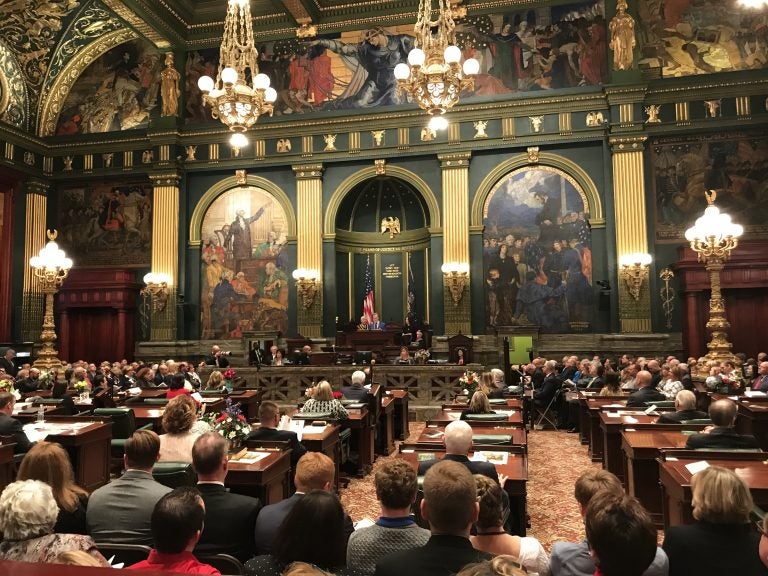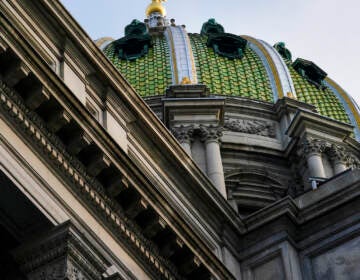Amid swearing-in, Pa. lawmakers add significant updates to chamber rules
Pennsylvania’s House and Senate swore in their newly-elected members on New Year’s Day and are now gearing up to start a two-year legislative session.

Pennsylvania State House on January 1, 2019 (Katie Meyer/WITF)
Pennsylvania’s House and Senate swore in their newly-elected members on New Year’s Day and are now gearing up to start a two-year legislative session.
As the Capitol flooded with lawmakers’ friends, families, and supporters, legislative leaders spoke on the floor about their priorities for the new session.
In the Senate, GOP Majority Leader Jake Corman advocated bipartisan efficiency, telling members it
“doesn’t matter what we’re for, doesn’t matter what we want to do. If we don’t get it done, we’ve failed.”
Democrats have long been in the minority in Harrisburg. That’s still the case this year, though after flipping 11 seats in the House and five in the Senate they’ll likely have some additional political clout.
House Minority Leader Frank Dermody echoed Republicans’ calls for compromise. But he noted, his caucus has grown and now has a fresh crop of young progressives — including a few Democratic Socialists.
“More than one fourth of our members are beginning today,” he said. “I think it’s of special interest to all of us that 40 of the House Democrats who arrived here in the last three years are women.”
Altogether, the House and Senate have 50 first-time members — one of the biggest influxes of new faces in years.
Those new faces weren’t the only change in the Capitol, though.
After swearing in new members, the chambers adopted updated rules that will govern their conduct for the next two years.
The House made over a dozen changes. Newly-minted GOP Majority Leader Bryan Cutler said he thinks it may be the most rule updates since 2007, when lawmakers overhauled their processes in the wake of a pay-raise scandal and the rules remained in limbo for months.
A few of the changes related to legislative process: the chamber slightly decreased the number of members assigned to standing committees and did away with the practice of filing “ghost amendments” — amendments tacked on to other, unspecified amendments on a bill, often for the purpose of bogging down legislation.
In addition, lawmakers voted to allow non-religious invocations at the start of sessions and passed a rule creating a new, bipartisan committee — known as the House Government Oversight Committee — with subpoena power to review actions by the executive branch.
They also ordered the Ethics Committee to investigate sexual harassment allegations.
However, activists pushing for new rules for drawing legislative district boundaries wanted the rule changes to go further.
They had proposed a number of updates designed to reduce legislative leaders’ power to halt bills they don’t like. One, for instance, would have compelled committees to release any bill co-sponsored by a majority of members onto the floor within two session days. Another would have made it easier to discharge stalled bills from committees.
Carol Kuniholm, who heads the group Fair Districts PA, said redistricting bills would be more successful if the bills could only get out of committee.
“There’s far too much power in the hands of leaders, and it’s a rather petty, partisan retribution against legislators who vote in the ways they’re told not to,” she said.
Though Fair Districts’ effort failed, Cutler said there still may be room for discussion.
“[The rules] are always temporary by their very nature, because we can amend, change, suspend, or redo them at any time,” he said.
Senators also made a few minor changes to their rules, including updated dress codes, chamber protocol, and access to amendments.
WHYY is your source for fact-based, in-depth journalism and information. As a nonprofit organization, we rely on financial support from readers like you. Please give today.






